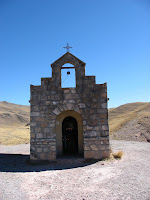the price of bread
 Via MEDH, the ecumenical human rights organization here in Argentina, I received yesterday a letter from the Bishop and staff of Humahuaca. Bishop Pedro Olmedo has pastoral care for one of the poorest regions of Argentina, in the far far north of the country. The region, encompassing parts of Salta and Jujuy, is stunningly beautiful, but living is difficult in a harsh climate with high unemployment and isolated communities. The mining industry, while providing employment, is contaminating the landscape.
Via MEDH, the ecumenical human rights organization here in Argentina, I received yesterday a letter from the Bishop and staff of Humahuaca. Bishop Pedro Olmedo has pastoral care for one of the poorest regions of Argentina, in the far far north of the country. The region, encompassing parts of Salta and Jujuy, is stunningly beautiful, but living is difficult in a harsh climate with high unemployment and isolated communities. The mining industry, while providing employment, is contaminating the landscape.
The letter is in response to the ongoing crisis between the Kirchner government and the campo (countryside, but more specifically here the farmers - especially the soya farmers who export the majority of their crop), arguing that forgotten heart of the matter is the impoverishment of an increasing number of Argentines.
It calls attention to the people who are dying for lack of medicines and medical attention, noting also:
Malnutrition, that appeared to be under control, is adding to the harsh reality of hunger and poverty, but... [the government] continue to give the same level of support as in years past. It is impossible for children and young people to be fed today on 60 centavos (10 pence) per day.The bishop goes on to criticize the government for its massaging of statistics concerning the level of inflation and cost of living. Insted of relying on such figures, people need to look at the cost of basic goods: a few months ago bread cost 3 pesos per kilo (50 pence), today it costs 5 pesos or more (~85 pence); a litre of oil has risen from 3 pesos to 8 pesos.
 According to the bishop, 60% of the region's inhabitants struggle to survive below the poverty line. Regional and national migration has increased, causing further problems in urban centres.
According to the bishop, 60% of the region's inhabitants struggle to survive below the poverty line. Regional and national migration has increased, causing further problems in urban centres.There is sense of being isolated, far from the centre of power in Buenos Aires. The government seems unconcerned about the growing poverty and has failed to initiate programmes of support.
Inflation is having an impact on my daily routine too as I look at the price of a cup of coffee or get the bill from the photocopiers and think 'ooch.' But it's nothing compared to the experience of those who were already only just clinging on.
The bishop's letter, accompanied by photos can be read here. I read it and remembered our trip to Salta and Jujuy this time last year. This is a area out of sight and out of mind for many porteños, except as a winter holiday destination. But many of the people who live there are struggling to get by. Like in so many other countries, such day to day poverty fails to get the attention of the wealthy and powerful. But it's time it did.
---
photos July 2007 (2nd by Caz)
Comments